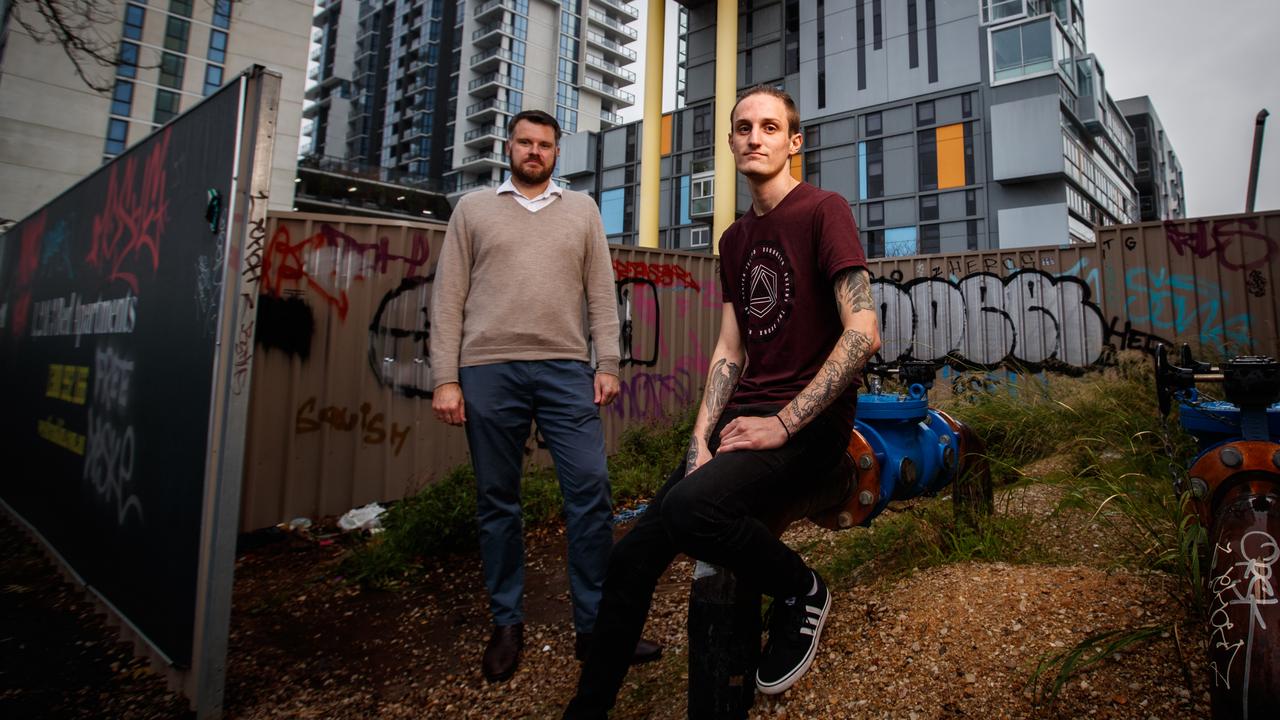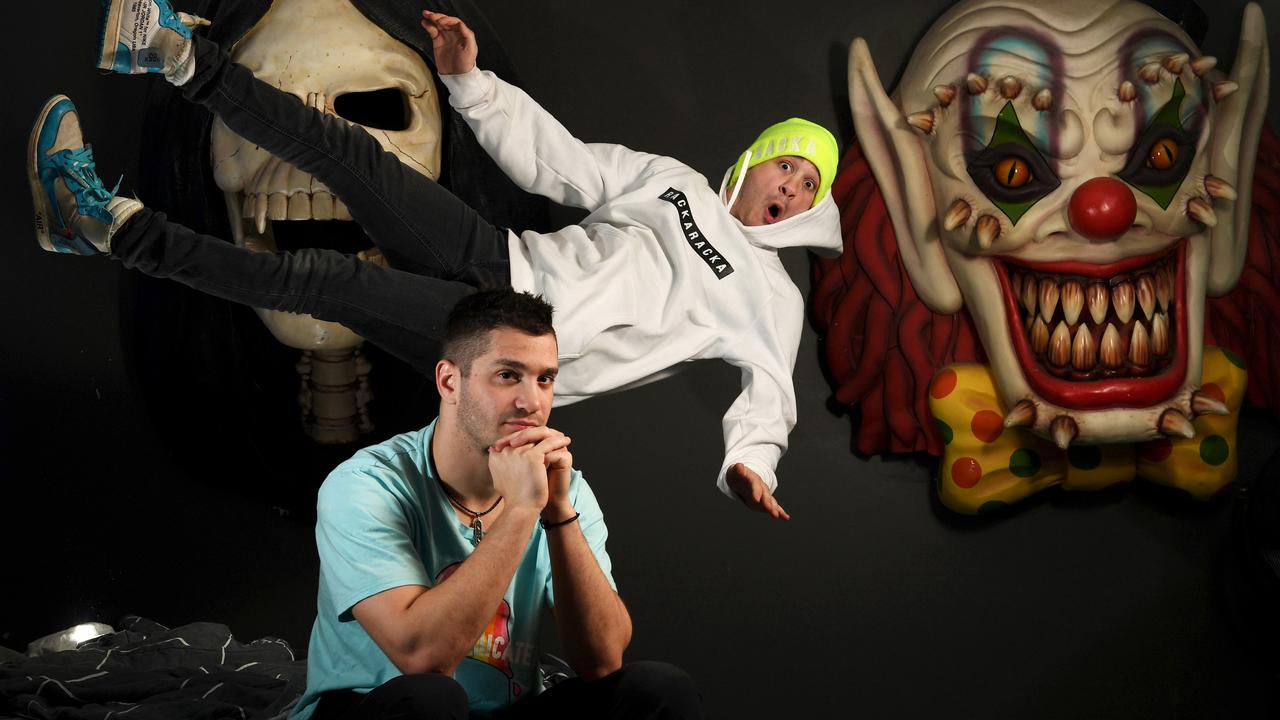Kyle Chalmers’ master stroke
HE went as an unknown to Rio with a secret hope to make the final of the 100m freestyle. He came home a national hero. Now all eyes are on Kyle Chalmers.
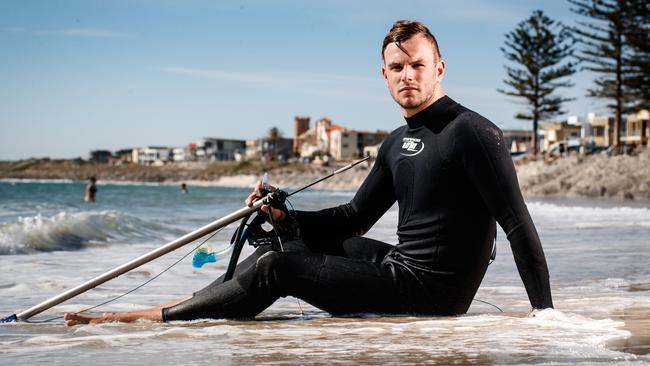
SA Weekend
Don't miss out on the headlines from SA Weekend. Followed categories will be added to My News.
ON the day he made magic in Rio, Kyle Chalmers got up at around 11am after a night of not much sleep.
The swimmers’ body clocks had to adjust to US prime time TV which meant popular races, like the 100 metres men’s freestyle final, weren’t until midnight. It was going to be a long day.
Chalmers, 18, had swum the heat and the semi-finals 24 hours earlier, piling personal best on personal best and breaking the junior world record twice.
It should have been intimidating but Chalmers has the happy knack of being able to shrug off race pressure.
Here he was, an Adelaide unknown in lane five up against the world’s best swimmers; American reigning world champion Nathan Adrian in the lane next to him and the other race favourite, Aussie roommate Cameron McEvoy in lane three. Instead of feeling nervous, Chalmers was relieved to have got this far.
“I was thinking, ‘This is what I came here to do, to make the final’ so it felt like my job was already complete,” he says.
“I’d done everything I could have hoped for, so I definitely felt a massive sense of relief knowing I had made that final because that’s what we had been training to do.”
He got up telling himself, “Yep, OK, this is the day”, had a shower, and went to the food hall for a self-prescribed breakfast of champions.
“I had Froot Loops, I reckon,” says Chalmers whose country-boy persona isn’t put on.
“Froot Loops with chocolate milk on top of them. That’s what I had.”
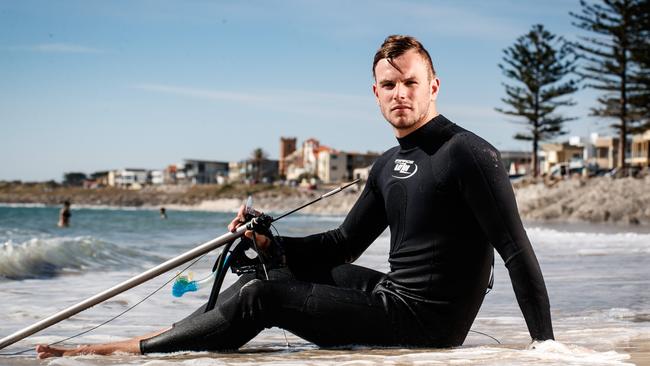
The way he looks at it, breakfast on the day of a race isn’t going to make a difference unless you do something stupid. The main thing was to eat because racers often struggle with appetite because of nerves. He isn’t like that. The relatively poor night’s sleep was driven more by excitement than anxiety.
“I’m a person who normally sleeps for 10 hours a night but just knowing it’s tomorrow means you have energy and adrenaline flowing through you,” he says. “I’m not someone who gets nervous and that’s one of my strengths.”
He thinks it might have been why he won.
Outsiders like me might assume that the gold medal makes Kyle Chalmers the best 100 metre swimmer in the world. He says he is not.
Other things pushed him first over the finish line, like a powerhouse back end and an empowered state of mind that keeps his body relaxed and ready. He approaches the start of each race with a Zen-like openness to what comes next. There are no expectations, and no inhibitions.
“It’s anybody’s race,” he says.
“If you’ve got a lane you have a chance. That’s how I looked at it; I’ve got myself a lane, I’ve earnt a lane, I’m swimming in the final so I have a chance. Everyone else has got exactly the same lane, the same block.”
He was unbowed by knowing that McEvoy had swum 100 metres in 47 seconds, the fastest ever in the world in a textile racing suit (rubberised bodysuits have been banned from races) and a time he could not beat. McEvoy was the best swimmer in the pool that night, Chalmers says, and yet he came in seventh. Adrian had swum times faster than Chalmers and there were others in the race who had clocked around 47.5 in heats and trials.
He knew this but like the boxer who goes into the ring proclaiming a win, he told himself he had a chance.
“So I know that I’m definitely not the best swimmer in the pool, but I’m one of the best racers. That’s how I look at it,” he says. “Racing is my strength.”
He stayed calm even as the time drew near.
After breakfast he went to the pool and put in about 500 metres just to loosen up. It was a treat to swim such a short distance, and he wore flippers to make it even easier. After a fully body massage and some stretches, he went home for a nap.
He closed his eyes for an hour and a half and told himself he was resting.
Then he gave up and played PlayStation with McEvoy, the Gold Coast science and maths student they call the rocket scientist because of his fascination with quantum gravity and string theory. They became friends when Chalmers was selected last year for the relays of the world swimming titles in Kazan, deep in Russia.
At a training camp in Qatar they shared hours of X-Box and PlayStation and became firm friends. In their Rio apartment there was nothing else to do, not even couches to sit on.
“We had a go for two hours, playing FIFA,” Chalmers says. “That gets me in the zone. I normally like to have a win before getting on the bus to go to the swimming pool. I get all excited about it; it calms me down for sure.”
He wasn’t analysing his races for last-minute changes. He didn’t even have his coach, Adelaide’s Peter Bishop, on hand. Bishop works with South Australia’s high-performance squad and Chalmers has total faith in his no-fuss style.
They were in close contact by phone and Bishop sent him funny pictures before the start of the race, just what he needed. At around 9pm. Chalmers went to the food hall for a snack; yoghurt and muesli this time, then got on a bus to be at the stadium two hours before the race. Some elite athletes withdraw into themselves before a performance but not Chalmers.
“Most of the guys are very serious and get in their head and just do their own thing. Fair enough, that’s what they want to do,” he says. “I’m someone who loves to walk around and talk to people and kick the footy around.”
He took his football into the stadium and was trading kicks with one of the physios when it accidentally lobbed into the back of the German coach at which point they were told to put it away.
Ninety minutes before the race he had a massage of his calf and feet to deal with a final growth spurt that could push his final height beyond 6.4”, then went through a push-up progression to turn his muscles on. After his training bathers and accreditation were checked, it was down to a 10-minute wait. Chalmers was still up for a chat but by now he was on his own.
There are many ways in which to race. Some are out of the block as fast as they can and try to stay in front to the end. Not Chalmers.
He aims at getting a good tempo on the way to the turn then comes home strong. At the turn he didn’t know exactly where he was – he was seventh – but he could see he was a body length behind Canada’s Santo Condorelli in lane six. It worried him but he knew he didn’t have the speed to win a flat-out race but he also felt that he was close enough to catch him and that spurred him on even more.
“If I could be within a second of them I knew that I could catch them on the way home,” he says. “I have the fastest back end in the world at the moment, so that’s my strength and that’s what I wanted to work to.”
This natural strategy made the race exhilarating to watch because from nowhere Chalmer summons up an incredible surge of power – the burn, or sting he calls it – that, just in time, propelled him to the front of the field.
“He has come from the clouds,” the race caller says, as stunned as anyone by the Australian’s win.
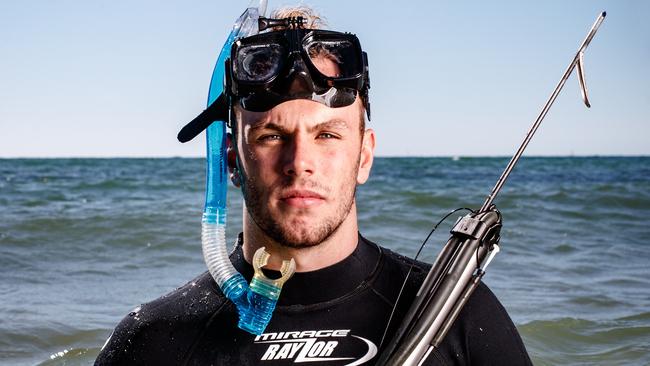
In 47.58 seconds, Chalmers wrote himself into history and the hearts of Australian and South Australians as the youngest male swimmer to win individual gold at the Olympics since Ian Thorpe, aged 18, in Sydney.
He was the first Australian to win the 100 metres since 1968 and he made everyone – his coach, his family, his state and his nation – extremely proud. “Wow, Kyle Chalmers is Australia’s first 100m free champ in almost 50 years (Michael Wenden),” tweeted Ian Thorpe. “Congratulations Kyle#SpeedTakes #Olympics”
In less than 50 seconds, everything changed forever.
At the time Chalmers couldn’t even smile. He was in the zone, his eyes fixed on the middle distance and he was conflicted. Yes, he had won but took no pleasure in it because McEvoy had frozen and come seventh.
“I was devastated for him, genuinely devastated because he has been there for me the whole time,” Chalmers says. “We went into the heats, he introduced me to everyone in the room, he took me under his wing, looked after me. Obviously I was really stoked about (the win) but I didn’t want to sort of rub it in.”
McEvoy ducked under the ropes to congratulate him, then got out of the pool next to him and held Chalmer’s hand aloft in a victory salute, proclaiming a new Australian champion. It was the act of a sportsman who put misery aside to celebrate the triumph of a friend.
Back with the team, people were crying. Queenslander James Roberts, 25, at his second Olympics gave Chalmers a long hug, saying, “I don’t think you realise what you’ve just achieved”.
“Everyone here has worked so hard to do those things and you’ve just done them as an 18-year-old,” he told Chalmers.
“That’s when it sunk in for me a little bit. I kind of went ‘wow’. I did not expect that someone who is one of my competitors back home would cry for me.”
There was still another race to get through, the medley two days later. He saw his family that night and the next day and told them how Usain Bolt walked into the dining room and everyone stood up. The next night he watched a bit of Prison Break and slept for 11 hours, raced again then went into about four days of media followed by dinners and clubbing.
He is not a partyer but he’s definitely a socialiser and he wanted to make the most of being in such company.
They say elite performers like ballerinas, actors and athletes can hold collapse at bay while the adrenaline flows but it’s the comedown that gets them. Chalmers came off a massive post-win high and into a patch of fast food, no routine and staying out late.
“Your body can’t handle it, or mine couldn’t, it cracked under the strain,” he says. Without even the symptoms of a cold, he came down with pneumonia and spent four days in the Olympic Village in bed, sleeping around the clock. He then flew home, still unwell, and slowly recovered over the next couple of weeks when he flew to Europe to be feted by Adidas, the sporting giant that signed him up as a virtual unknown.
Their reasonable expectation was that Chalmers might make the Rio finals but a win wasn’t on the cards until Tokyo in 2020. Instead, he had already delivered.
“They are thrilled with me; they probably didn’t expect me to come on this quickly,” Chalmers says. “I did a photoshoot in Marseilles advertising their bathers that are coming out in the next two years. Amazing. A photoshoot in France, crazy crazy stuff.”
It was during the photoshoot that signs emerged of a budding romance with Madi Wilson, a lean and muscly backstroke and relay swimmer who was at Kazan and Rio. She is also an Adidas swimmer and they shared the photoshoot then went to London together where Wilson posted a picture of herself looking particularly sunny while Chalmers kissed her on the cheek.
He is circumspect, aware now that whatever he says gets blown up in print. It’s early days, he says, and they like hanging out together but they’re just good friends. Her Instagram says they’re more, and why not?
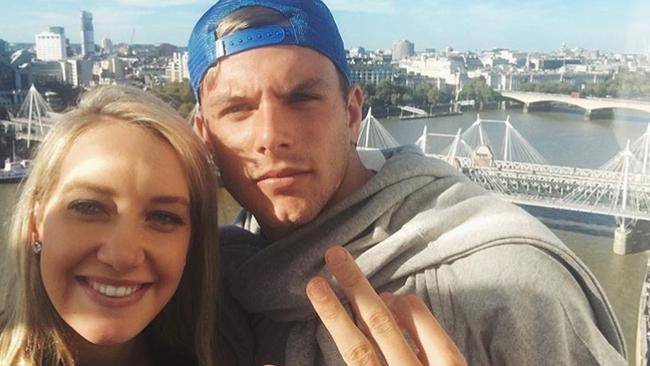
“She likes to take photos and post them on Instagram or whatever,” he laughs. “She’s a really cool girl. I enjoy her company.”
The question now is how to refocus his training and race program now everyone knows who Kyle Chalmers is. He is no longer flying under the radar, a supersized schoolboy athlete untested in the adult arena. He is now the target, the one others will try to bring down.
“Obviously I’ve thought about that, but I know that I’m still 18 and, at that race at the Olympic Games, I wasn’t the best swimmer in the pool. I just got lucky on the night, that’s all,” he says.
The first time I interviewed Chalmers, well before Rio, we sat quietly at the State Swim Centre and chatted away. The coaches and management knew who he was but that was it. This time he was surrounded by swim fans young and old who offered up bathing caps and bits of paper for him to sign. He tries not to mind and in theory he’s fine with it but as a daily event it can be wearing. It is harder to move around freely and he is just a bit more wary knowing that he is now a public figure and what he says and does matters.
Getting back into training has been a struggle. He had five weeks of light training where he was in the water only two or three times, then went to Europe, then Port Lincoln for a welcome home ceremony plus other appearances in Melbourne on the weekend of the AFL Grand Final. It is only a year since he gave up the dream of following his father, former Crows and Port player Brett Chalmers, into the AFL, and being at the Grand Final caused a pang.
The game was as thrilling as it gets with the Western Bulldogs winning against the might of the Sydney Swans, and Chalmers admits to twinges of regret at having to give up on the game he expected to play.
It turns out he also has nerves about some things, just not the Olympics. “I was sitting at the table, Taylor Walker was at the table next to me, there were a lot of guys there and I’m still a massive fanboy I guess,” he says. “I get too nervous to go and speak to them so I just sat there.”
He went back into training with no goal other than to try for the short course team events in Canada at the end of the year. Short course isn’t his strength but there are plenty of events offering prize money and it would be a great way to improve his front-end skills.
“I’ve come off such a serious block of training going into the Olympic Games and done everything I could to get to the pinnacle of the sport,” he says.
“Now I want to come back and enjoy the next six months, enjoy swimming but not as serious.”
At the time Chalmers said this, he had gone since December 24 last year without suffering from any of the short but debilitating bouts of heart arrhythmia that are the result of a mild heart condition called supraventricular tachycardia (SVT). But in Brisbane in early November for the national shortcourse championships, he had an attack during the warm-up before the 100 metre freestyle race.
“That night I warmed up, felt fine, did everything I’d been doing,” he says.
“I’d raced in Singapore and Tokyo before that, did everything the same, then did my warm-up and got to the last 25 metres and my heart started going.”
He came out of the pool and lay down for about 10 minutes to endure the dizziness that borders on black out. It passed and he went to the medical room but was told not to risk a race. Watching the 100 metres race sidelined by illness in the stands was one of the toughest things he has had to do.
“I’m pretty shattered about things because I wanted to win my first national title there,” he says. “And I know that with the time I did in Tokyo, I would have won so it was really hard for me watching the race.”
He came out of it shattered. Physically, he was tired and washed out and he spoke to the head coach of Swimming Australia who told him to take a break. He had a week and a half off, catching up with friends from Immanuel. He returned to the pool with a sense of relief that it hadn’t happened in Rio. “It’s something I’ve had since I was 9, 10 years old and I just have to deal with it,” he says. “Sometimes, it sucks.”
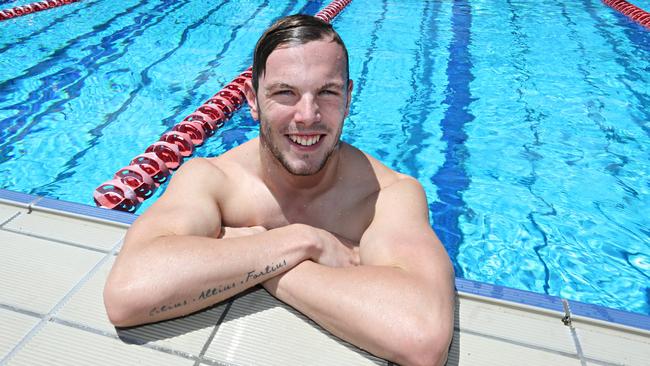
He will defend his Olympic title in Tokyo in 2020 but the lead up to that is years away. In the meantime there is much he wants to do. “I’ve never swum individually in a world championship, never swum individually at a Commonwealth Games,” he says. “So these next two years are going to be a whole new experience for me again. That’s why I’m not putting pressure on myself because I’ve got no idea what to expect.”
He is in prime position to make serious money through sporting sponsorships and is taking it all carefully and slowly, his father Brett in the background offering a guiding hand. As part of life post-Rio he has changed management from the global agency TLA to Sports & Entertainment Limited whose clients include Ian Thorpe and Shane Warne. He is moving slowly and feels no rush.
“There’s definitely companies who are interested,” he says.
“There is money out there but it will come, it will come. I’m taking it slowly, day by day, and hopefully will sign some deals soon.”
He has left school behind because he had to. He went to Immanuel for two and a half days at the start of this year then left – pretty much a perfect school year, he jokes. He will get his SACE certificate and follow his father’s advice to go to university to set himself up for life after swimming. But education is something he can come back to; a crack at the Olympics was not. Next year he will study German on the side.
Over Christmas he will disappear to a shack 80km from Pt Lincoln with his parents, brother Jackson, grandparents and cousins for what sounds like an idyllic summer holiday. He will go spear fishing and play with his drone, which has a flight range of up to 5km. He uses it for photographs and says you can fly it over pods of dolphins and whales to film what they are doing.
His name is already in the record books and his potential as a future champion is unknown. In the past two years he has shaved about a second a year off his 100 metre times and he knows he can improve. Male swimmers don’t usually peak until age 22 or 23 which will work well for Tokyo. He is convinced he has not reached anywhere near his potential. Whatever comes next, the world will be watching.
This year, he avoided the media in the lead up to the Olympics, “descending from the clouds” to swoop up the prize. That won’t happen again. “That’s the thing, and that’s the way I’ve got to look at it,” he says with a shrug.
“It’s going to be a challenge, don’t get me wrong, and I’m going to struggle with it and it’s something I’m going to have to adapt to over time.
“But I’m looking forward to it.”

